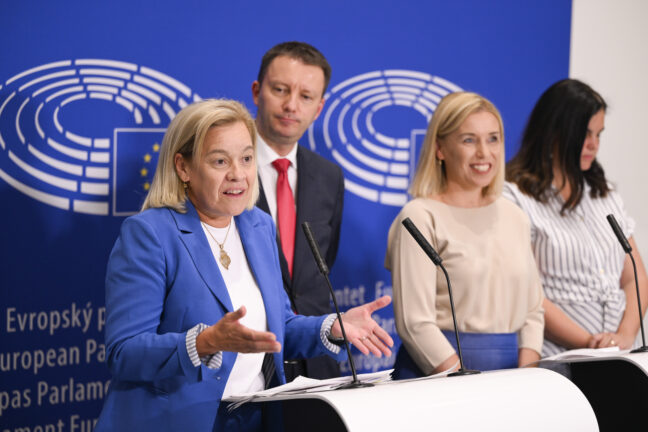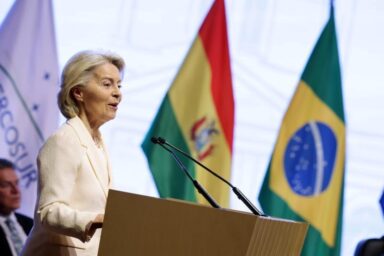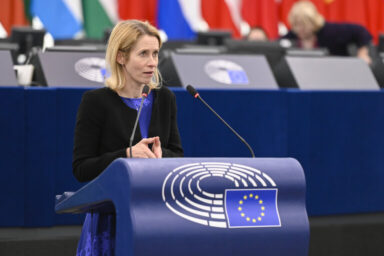The European Commission has proposed the 2028-2034 Multiannual Financial Framework, a nearly €2tn budget that sets the EU’s spending priorities for the next seven years. Valued at 1.26% of the EU’s gross national income, the draft introduces changes aimed at making Europe more competitive in technology, industry, and innovation.
This proposal reflects the growing geopolitical tensions and economic competition worldwide. Central to it is a new €410bn Competitiveness Fund, which Commission President Ursula von der Leyen called essential for building a “prosperous, secure and thriving” EU. However, the budget’s presentation has already raised political concerns, despite positive signals on digital policy cooperation.
EU Perspectives spoke with Portuguese MEP Carla Tavares (S&D/PRT), co-rapporteur on the Multiannual Financial Framework (MFF), about the growing fragmentation between Parliament and the Commission, as well as the plans for technology investments.
Competitiveness Fund worth €410 billion
For the first time, the EU’s long-term budget includes a dedicated fund for competitiveness. The proposed €410bn Competitiveness Fund would consolidate various existing programmes under a single heading. This includes boosting industrial innovation, green transition technologies, digital infrastructure, and expanding the startup ecosystem. In all these areas Europe has struggled to keep pace internationally.
Key elements of the fund include Horizon Europe, the EU’s flagship research and innovation programme. Horizon Europe takes almost half of the Competitiveness Fund, receiving €175bn of the total €410bn making it the core engine of EU research and innovation. That is a big increase from the €95.5bn in the previous long-term budget.
You might be interested
The revamped Horizon Europe will be structured around four strategic pillars, the biggest of which is called Competitiveness and Society. It will channel nearly €76bn into collaborative research aimed at both technological leadership and tackling pressing societal challenges such as descarbonisation, biotech, and defence-related innovation.
Additional dedicated amounts within the competitiveness pillar include digital leadership (€55 billion), resilience and defence (€130bn), and the clean energy transition (€67bn).
The fact that the budget is now divided into three main areas, social, competitiveness, and external action, is very positive. – MEP Carla Tavares
This reconfiguration reflects a broader ambition: to close Europe’s persistent innovation gap and transform research outcomes into market-ready technologies. The Competitiveness Fund bridges the entire innovation lifecycle, from early-stage research to commercial deployment.
In the view of Carla Tavares, while divergences with the Commission exist, this aspect of the budget structure is positive. “We believe that the fact that the budget is now divided into three main areas, social, competitiveness, and external action, is very positive. That isn’t the structure of the current financial framework. So there was already a clear effort to recognise competitiveness as its own funding line. That’s a good thing,” said Tavares.
Parliament left in the dark
The MFF presentation raised tensions between the Commission and the European Parliament. During the rollout in Brussels, President von der Leyen presented the budget to the public before formally submitting the text to Parliament. Members of the Committee on Budgets say they were left scrambling for details, receiving the proposal at the same time as the press.
What Parliament felt was a clear lack of respect. – MEP Carla Tavares
Carla Tavares called the situation “surreal”. “What Parliament felt, and what I felt as rapporteur, was that there was a clear lack of respect towards the institution. The President of the Commission had been in a meeting with political leaders, the President of Parliament, the rapporteurs, and the Chair of the Budget Committee, where she made a clear commitment: that as soon as the College of Commissioners voted, the document would be promptly shared with us. That didn’t happen. Instead, there were delays, confusion, no documents, and even journalists had more information than we did. It started badly.”
Too early for judgments
Despite the rocky start, Tavares welcomed the creation of a dedicated Competitiveness Fund, a long-standing demand from Parliament. However, when asked how it compares to state-led innovation strategies in the US and China, she remained cautious. Without more clarity on how the fund will be implemented, she said, it is too early to make that judgment.
“We understand that it is absolutely urgent for Europe to strengthen its role in competitiveness. At this stage, it’s impossible to make that judgment, but it was essential to create a specific fund, and Parliament always insisted on this,” she said.
According to the Commission’s outline, the Competitiveness Fund will support a broad range of priorities. These include scaling up industrial innovation, expanding digital infrastructure, accelerating startup growth, investing in education and skills, and developing strategic technologies.
Risks of renationalisation of the budget
But as negotiations begin, a recurring concern among MEPs is that the proposal could accelerate a renationalisation of the EU budget, particularly through the new “National and Regional Partnership Plans,” which give Member States a greater role in setting spending priorities.
What we advocate is a significant involvement of Member States, but always in alignment with a European policy framework. – MEP Carla Tavares
MEP Tavares stressed that while national governments will play a role in delivery, the strategic direction must stay at the European level. This is especially the case of sectors like innovation and startups, where scale and coherence matter.
“There is an essential partner in these areas: the business sector,” she said. “What we advocate across all areas of competitiveness is a strong involvement of the Member States, but always in line with what should be a clearly defined European policy in this field. We believe that, given the challenges Europe faces, and a need to assert itself in the face of pressure from China and the United States. This can only be achieved through a united Europe, with all 27 Member States working together,” MEP Tavares adds.
Crossborder investment
The MFF also proposes extending competitiveness investments beyond the EU’s borders, supporting digital and strategic development in candidate countries and neighbouring regions. When asked about the balance between internal EU digital investments and support for partners like Ukraine and the Western Balkans, MEP Tavares backed a broader approach.
“Our priority must be to support all European countries, whether or not they are already EU members,” she said. “We look positively at investments both inside the EU and in countries preparing to join. Competitiveness also needs to be projected externally.”
She pointed to her recent visit to Montenegro as an example, highlighting the country’s commitment to digital development despite challenges such as limited administrative capacity.
Digital policy not a conflict area
Regarding digital policy, Ms Tavares does not foresee conflict between the European Parliament and the Commission. She asserted that both institutions are aligned in their support for the Competitiveness Fund. For her, competitiveness extends beyond economic factors to include education, skills, employment, startups, and digital transformation.
“I don’t see digital as a conflict area between Parliament and the Commission. If anything, we’re aligned. Parliament always supported the creation of a Competitiveness Fund. For us, competitiveness is not just about the economy, it’s about education, skills, employment, startups, and digital transformation.”
For us, competitiveness is not just about the economy, it’s about education, skills, employment, startups, and digital transformation. – MEP Carla Tavares
However, the MFF proposal arrives amid ongoing political disputes between the European Parliament and the Commission. While digital policy may not become a major battleground, other areas such as agricultural spending, cohesion funds for less-developed regions, and conditions tied to budget access (macro-conditionality) are expected to see fierce debate.
Negotiations to begin in September
The next step is the regulatory framework, expected in early September It will define how the fund and other budget parts will be managed. After that, the European Parliament and Council will negotiate, potentially amending priorities.
Until then, debates will continue inside institutions and between Member States. The MFF will test Europe’s ability to balance innovation with inclusion, and national interests with shared goals.











